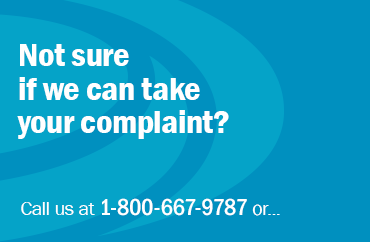After Making a Complaint
When you bring your complaint to us, we will ask you questions to better understand what happened. We will decide whether we can take the complaint, and if so, how we will work on it.
Steps We May Take
Depending on the circumstances, we may ask you for:
- more details in writing
- copies of invoices or letters, or other relevant documentation
We may make some initial calls to the public service institution in question to learn more and to find out if the problem may be solved quickly.
For an overview of the complaint process, see our flowchart.
There are some complaints we do not or cannot take. They may be outside our jurisdiction or we may decide that it would not be appropriate for us to proceed. If we decide not to take the complaint, we will give you reasons for our decision.
Will we investigate your complaint?
We will consider relevant information and decide what to do next. For example, we might:
- try to resolve the problem informally by working with you and the public service institution.
- investigate the specific problem that happened to you.
- investigate the problem on a system-wide basis.
What kinds of results can you expect?
Our work on a complaint can result in a variety of outcomes. Here are some examples:
- You and the government office may develop a better working relationship.
- The government organization may voluntarily take steps to correct or improve the situation.
- The Ombudsman may decide that the government office acted fairly and nothing more needs to be done.
- The Ombudsman may decide that the government office acted unfairly or could have done better. If so, we may make recommendations to the government organization to correct an unfairness or follow a fairer process.
Whatever the outcome, we will share our conclusions with you and explain our reasoning.
For examples of how we have resolved cases that have come to us, see Featured Cases and Public Reports.


